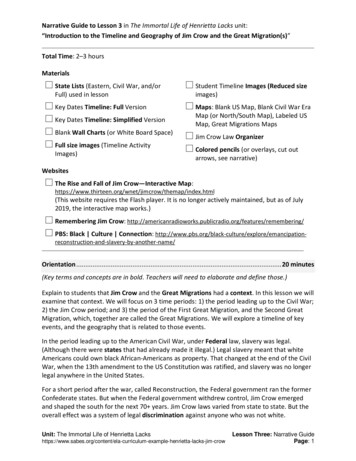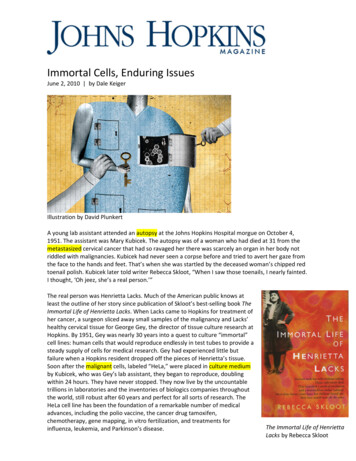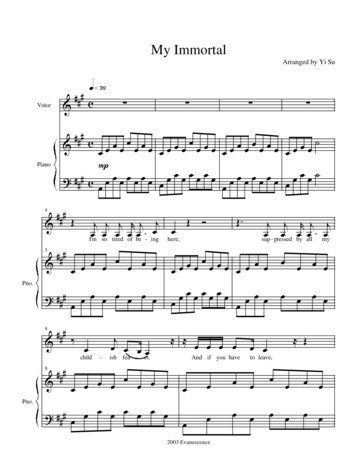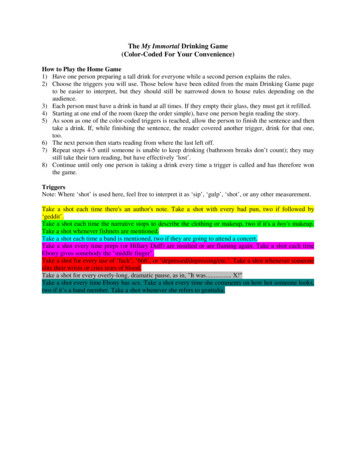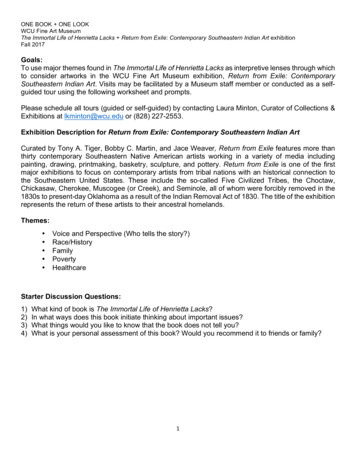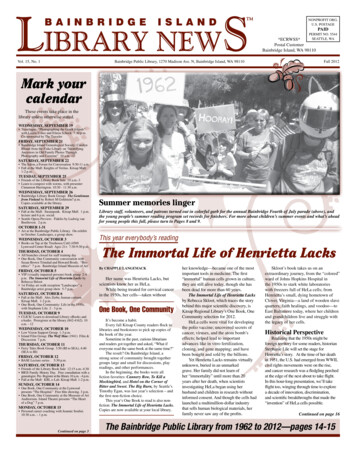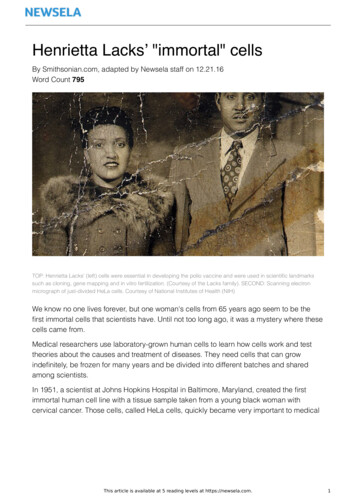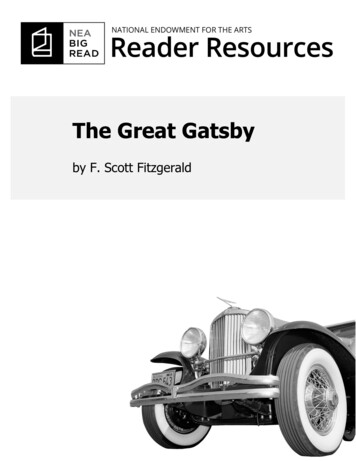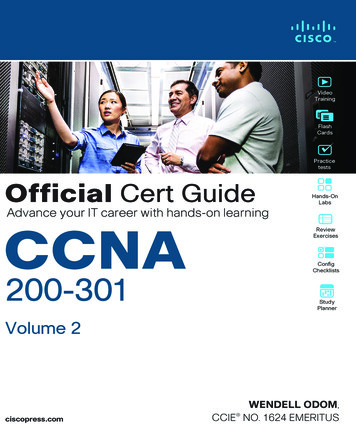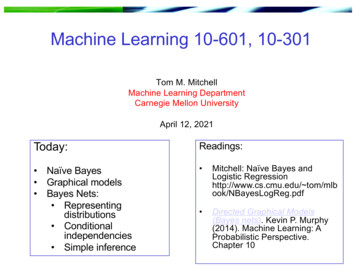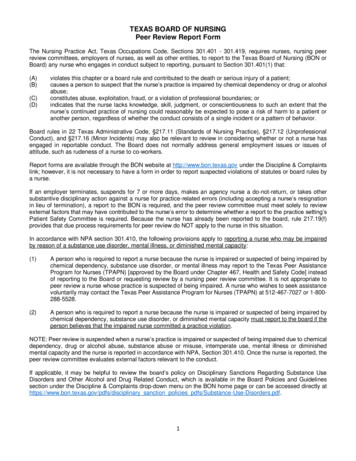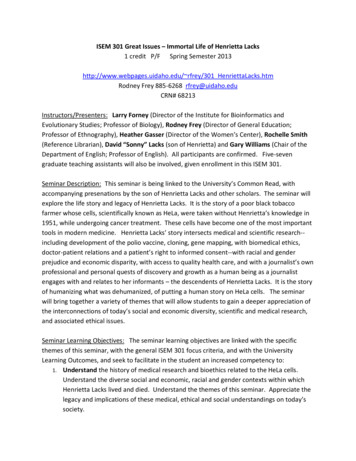
Transcription
ISEM 301 Great Issues – Immortal Life of Henrietta Lacks1 credit P/F Spring Semester 2013http://www.webpages.uidaho.edu/ rfrey/301 HenriettaLacks.htmRodney Frey 885-6268 rfrey@uidaho.eduCRN# 68213Instructors/Presenters: Larry Forney (Director of the Institute for Bioinformatics andEvolutionary Studies; Professor of Biology), Rodney Frey (Director of General Education;Professor of Ethnography), Heather Gasser (Director of the Women’s Center), Rochelle Smith(Reference Librarian), David “Sonny” Lacks (son of Henrietta) and Gary Williams (Chair of theDepartment of English; Professor of English). All participants are confirmed. Five-sevengraduate teaching assistants will also be involved, given enrollment in this ISEM 301.Seminar Description: This seminar is being linked to the University’s Common Read, withaccompanying presenations by the son of Henrietta Lacks and other scholars. The seminar willexplore the life story and legacy of Henrietta Lacks. It is the story of a poor black tobaccofarmer whose cells, scientifically known as HeLa, were taken without Henrietta’s knowledge in1951, while undergoing cancer treatment. These cells have become one of the most importanttools in modern medicine. Henrietta Lacks’ story intersects medical and scientific research-including development of the polio vaccine, cloning, gene mapping, with biomedical ethics,doctor-patient relations and a patient’s right to informed consent--with racial and genderprejudice and economic disparity, with access to quality health care, and with a journalist’s ownprofessional and personal quests of discovery and growth as a human being as a journalistengages with and relates to her informants – the descendents of Henrietta Lacks. It is the storyof humanizing what was dehumanized, of putting a human story on HeLa cells. The seminarwill bring together a variety of themes that will allow students to gain a deeper appreciation ofthe interconnections of today’s social and economic diversity, scientific and medical research,and associated ethical issues.Seminar Learning Objectives: The seminar learning objectives are linked with the specificthemes of this seminar, with the general ISEM 301 focus criteria, and with the UniversityLearning Outcomes, and seek to facilitate in the student an increased competency to:1. Understand the history of medical research and bioethics related to the HeLa cells.Understand the diverse social and economic, racial and gender contexts within whichHenrietta Lacks lived and died. Understand the themes of this seminar. Appreciate thelegacy and implications of these medical, ethical and social understandings on today’ssociety.
ISEM 301 - Henrietta Lacks2University Learning Outcome 1 – Learn and integrate. Through independent learning andcollaborative study, attain, use, and develop knowledge in the arts, humanities, sciences, andsocial sciences, with disciplinary specialization and the ability to integrate information acrossdisciplines.2. Identify, understand and discuss current, real-world issues.University Learning Outcome 2 – Think and create. Use multiple thinking strategies to examinereal-world issues, explore creative avenues of expression, solve problems, and makeconsequential decisions3. Distinguish and integrate differing forms of knowledge and academic disciplinaryapproaches (e.g., humanities and sciences) with that of the student’s own academicdiscipline (e.g., in agriculture, architecture, art, business, economics, education,engineering, natural resources, etc.). And apply a multidisciplinary strategy to addresscurrent, real-world issues.University Learning Outcomes 1 – Learn and integrate. Through independent learning andcollaborative study, attain, use, and develop knowledge in the arts, humanities, sciences, andsocial sciences, with disciplinary specialization and the ability to integrate information acrossdisciplines, and 2 – Think and create. Use multiple thinking strategies to examine real-worldissues, explore creative avenues of expression, solve problems, and make consequentialdecisions.4. Improve oral and written communication skills.University Learning Outcome 3 – Communicate. Acquire, articulate, create and convey intendedmeaning using verbal and non-verbal method of communication that demonstrates respect andunderstanding in a complex society.5. Explore an appreciation of the self in relation to its larger diverse social and academiccontexts.University Learning Outcome 4 – Clarify purpose and perspective. Explore one’s life purposeand meaning through transformational experiences that foster an understanding of self,relationships, and diverse global perspectives.6. Apply principles of ethics and respect in interaction with others.University Learning Outcome 5 – Practice citizenship. Apply principles of ethical leadership,collaborative engagement, socially responsible behavior, respect for diversity in aninterdependent world, and a service-oriented commitment to advance and sustain local andglobal communities.Seminar Themes (to be reframed as current issues, dilemmas or challenges)Medical and scientific research
ISEM 301 - Henrietta Lacks3Medical and scientific bioethics and informed consentRace, class and genderPovertyCivility and citizenshipUnderstanding the self and one’s discipline in a diverse social contextApplying a multidisciplinary approach, e.g., humanities, natural science and socialscience, to address a current issue, e.g., understanding and communicatingscientific (STEM) knowledge and educationLearning Activities: Each of the four learning activities is linked to the seminar themes andlearning objectives, as well as to the University Learning Outcomes.A. Text Reading: The Immortal Life of Henrietta Lacks by Rebecca Skloot. BroadwayPaperbacks: New York, 2010.B. Attendance and Participation in Workshops: Attendance required at all sessions, withparticipation in the last two sessions. All eight sessions Tuesday evenings, 7:00 to 9:00.1. January 15 at 7:00 pm Location: Renfrew 111. Led by Rodney Frey, provide seminarorientation, meet graduate teaching assistants and assign discussion seminar groups (of30 students each). Break-off into seminar groups and go to separate rooms to reviewsyllabus, learning objectives and activities (seminar participating, discussion andreflective paper requirements), the grading criteria, and study guide questions with thegraduate assistant. Students will familiarize themselves with their seminar group andgraduate assistant. Seminar Locations at 8:00 pm: TLC 147, TLC 148, TLC 149, TLC 2222. January 22 at 7:00 pm Location: Ballroom of SUB. Keynote Address by David Jr.“Sonny” Lacks, son of Henrietta Lacks (FREE Open to the general public)3. January 29 at 7:00 pm Location: Renfrew 111. Gary Williams – a humanitiesapproach(FREE Open to the general public)4. February 5 at 7:00 pm Location: Renfrew 111. Larry Forney – a scientific approach andbioethical issues (FREE Open to the general public)5. February 12 at 7:00 pm Location: Renfrew 111. Heather Gasser – social scienceapproach and gender and social issues (FREE Open to the general public)6. February 19 at 7:00 pm Location: Renfrew 111. Rochelle Smith – open topic andexploring the library and further research opportunities (FREE Open to the generalpublic)
ISEM 301 - Henrietta Lacks47. February 26 at 7:00 pm Locations: TLC 147, TLC 148, TLC 149, TLC 222. Led by graduateteaching assistants, meet in seminar groups to discuss and reflect on the speakers andreading (in context of UI Learning Outcomes and specific ISEM themes, using studyguide questions)8. March 5 at 7:00 pm Locations: TLC 147, TLC 148, TLC 149, TLC 222. Led by graduateteaching assistants, meet in seminar groups to discuss/present each student’s reflectivepaper.C. Seminar Participation. Each student will have an opportunity to orally articulate anddiscuss one or more of the seminar themes. The themes will be reframed andpresented as a current ethical, scientific, social, or medical dilemma or challenge thatneeds resolution. The discussion will seek to have each student demonstrate his or herability to: 1. Convey an understanding of the seminar theme addressed; 2. Distinguishand integrate differing academic disciplines and/or approaches (as presented byspeakers and including student’s own disciplinary background), along with the student’sown academic discipline. 3. Apply that integrated disciplinary approach to addressingthe dilemma or challenge posed in the seminar; 4. Identify and reflection on how “theself” is articulated and relates to the larger social context; 5. Effectiveness in oralcommunications.D. Reflection paper (“assessment artifact”). Length: Minimum of 10 pages (double-spacedin proper MLA or APA style). The student selects one of the seminar themes andexplores its implications and possible resolutions from an integrated yet multipledisciplinary approaches. The student is to demonstrate: 1. An understanding of a keytheme as presented in the textbook and by the presenters; 2. An ability to distinguishand understanding multiple academic disciplines, including his or her own; 3. An abilityto integrate a multiple disciplines (distinct from and including the student’s own) in anappreciation of a current issue; 4. An ability to clarify his or her own self in relation toone of the current issues/themes; 5. And ability to effectively communicate throughwriting, using and properly referencing at least three library resources (print or digital).Grading Criteria Rubric - Pass/Fail This rubric is embedded in and applied to the seminarstudent learning activities (discussions/presentations and the reflective paper). The rubric wasderived, with modifications, from VALUE Association of American Colleges and University(found at http://www.aacu.org/value/index.cfm or http://bblearnhelp.uidaho.edu/sample-rubrics.html ). Ateam, led by the instructor of record and made up of the graduate student assistants, wouldutilize this rubric to grade the seminar discussions and reflective papers, thus providing a
5ISEM 301 - Henrietta Lacksuniform and systematic means of grading a potentially large number of students using severalgraders. Scoring scale: average of 3.0 for passing grade.LearningObjectives:Minimal (1)Emerging (2)Emerging (3)Competent (4)1.Based upon the themes ofthe seminar, presentsinformation from irrelevantsources representinglimited points ofview/approaches.Demonstrates a limitedability in identifying aproblem statement orrelated contextual factors.Based upon the themes ofthe seminar, presentsinformation from relevantsources representinglimited points ofview/approaches.Begins to demonstrate theability to construct aproblem statement withevidence of most relevantcontextual factors, butproblem statement issuperficialWhen prompted, connectsexamples, facts, ortheories from own field ofstudy or discipline.Based upon the themes ofthe seminar, presents indepth information fromrelevant sourcesrepresenting various pointsof view/approaches.Demonstrates the ability toconstruct a problemstatement with evidence ofmost relevant contextualfactors, and problemstatement is adequatelydetailed.Independently connectsexamples, facts, or theoriesfrom own field of study ordiscipline.Based upon the themes ofthe seminar, synthesizes indepth information fromrelevant sourcesrepresenting various pointsof view/approaches.Demonstrates the ability toconstruct a clear andinsightful problemstatement with evidence ofall relevant contextualfactors.Understandcontent2.Identify Issuesidentifies3.Distinguish,Integrate, Addressconnect self with ownacademic disciplineWhen prompted, presentsexamples, facts, or theoriesfrom own field of study ordiscipline.differentiate disciplinesWhen prompted, presentsexamples, facts, or theoriesfrom more than one field ofstudy or discipline.When prompted, connectsexamples, facts, ortheories from more thanone field of study ordiscipline.Independently connectsexamples, facts, or theoriesfrom more than one field ofstudy or discipline.integrates disciplinesto address issuesUses, in a basic way, skills,abilities, theories, ormethodologies gained inown discipline in a newsituation.Uses skills, abilities,theories, or methodologiesgained from multipledisciplines to contribute tounderstanding of problemsor issues.Adapts and applies skills,abilities, theories, ormethodologies gained frommultiple disciplines to solveproblems or explore issues.4.In addressing themes ofseminar, uses appropriateand relevant content todevelop simple ideas insome parts of the work.In addressing themes ofseminar, uses appropriateand relevant content todevelop and explore ideasthrough most of the work.In addressing themes ofseminar, uses appropriate,relevant, and compellingcontent to explore ideaswithin the context of thediscipline and shape thewhole work.Insufficient supportingmaterials (explanations,examples, illustrations,statistics, analogies,quotations from relevantauthorities) make referenceSupporting materials(explanations, examples,illustrations, statistics,analogies, quotations fromrelevant authorities) makeappropriate reference toSupporting materials(explanations, examples,illustrations, statistics,analogies, quotations fromrelevant authorities) makeappropriate reference toCommunicatewrittenoralIndependently createswholes out of multiple parts(synthesizes) or drawsconclusions by combiningexamples, facts, or theoriesfrom own field of study ordisciplineIndependently createswholes out of multiple parts(synthesizes) or drawsconclusions by combiningexamples, facts, or theoriesfrom more than one field ofstudy or discipline.Adapts and applies,independently, skills,abilities, theories, ormethodologies gained frommultiple disciplined tosolve difficult problems orexplore complex issues inoriginal ways.In addressing themes ofseminar, uses appropriate,relevant, and compellingcontent to illustratemastery of the subject,conveying the writer'sunderstanding, and shapingthe whole work.A variety of types ofsupporting materials(explanations, examples,illustrations, statistics,analogies, quotations fromrelevant authorities) make
6ISEM 301 - Henrietta Lacksto information or analysisthat minimally supports thepresentation or establishesthe presenter'scredibility/authority on thetopic.information or analysisthat partially supports thepresentation or establishesthe presenter'scredibility/authority on thetopic.information or analysis thatgenerally supports thepresentation or establishesthe presenter'scredibility/authority on thetopic.sourcesDemonstrates an attemptto use sources to supportideas in the written andverbal communications.Demonstrates consistentuse of credible, relevantsources to support ideasthat are situated within thediscipline and in the writtenand verbalcommunications.5.SelfAt a surface level, reviewsprior learning (pastexperiences inside andoutside of the classroom)and the themes of theseminar, without revealingclarified meaning orindicating a broaderperspective abouteducational or life events,and the self.Demonstrates an attemptto use credible and/orrelevant sources tosupport ideas that areappropriate for thediscipline and in thewritten and verbalcommunications.With some depth, reviewsprior learning (pastexperiences inside andoutside of the classroom)and themes of seminar,revealing slightly clarifiedmeanings or indicatingsomewhat broaderperspectives abouteducational or life events,and the self.6.EthicsStudent states a positionbut cannot state theobjections to andassumptions and limitationsof the different ethicalperspectives/concepts.Student states a positionand can state theobjections to, assumptionsand implications ofdifferent ethicalperspectives/concepts butdoes not respond to them(and ultimately objections,assumptions, andimplications arecompartmentalized bystudent and do not affectstudent's position.)Identifies components ofother cultural perspectivesbut responds in allsituations with ownworldview.Student states a positionand can state the objectionsto, assumptions andimplications of, andrespond to the objectionsto, assumptions andimplications of differentethicalperspectives/concepts, butthe student's response isinadequate.ethicsrespectViews the experience ofothers but does so throughown cultural worldview.In depth review of priorlearning (past experiencesinside and outside of theclassroom) and themes ofseminar, revealing fullyclarified meanings orindicating broaderperspectives abouteducational or life events,and the self.Recognizes intellectual andemotional dimensions ofmore than one worldviewand sometimes uses morethan one worldview ininteractions.appropriate reference toinformation or analysis thatsignificantly supports thepresentation or establishesthe presenter'scredibility/authority on thetopic.Demonstrates skillful use ofhigh-quality, credible,relevant sources to developideas that are appropriatefor the discipline and in thewritten and verbalcommunications.In depth review of priorlearning (past experiencesinside and outside of theclassroom) and themes ofseminar to revealsignificantly changedperspectives abouteducational and lifeexperiences, and the self ,which provide foundationfor expanded knowledge,growth, and maturity overtime.Student states a positionand can state the objectionsto, assumptions andimplications of and canreasonably defend againstthe objections to,assumptions andimplications of differentethicalperspectives/concepts, andthe student's defense isadequate and effective.Interprets interculturalexperience from theperspectives of own andmore than one worldviewand demonstrates ability toact in a supportive mannerthat recognizes the feelingsof another cultural group.Department Support. This pilot ISEM 301 seminar was initiated and supported by DeanKatherine Aiken, College of Letters, Arts and Social Sciences.
ISEM 301 - Henrietta LacksSponsoring Event Support This pilot ISEM 301 seminar is supported by the Common Readcommittee, led by Associate Vice President for Student Affairs and Dean, Bruce Pitman.7
accompanying presenations by the son of Henrietta Lacks and other scholars. The seminar will explore the life story and legacy of Henrietta Lacks. It is the story of a poor black tobacco farmer whose cells, scientifically known as HeLa, were taken without Henrietta
